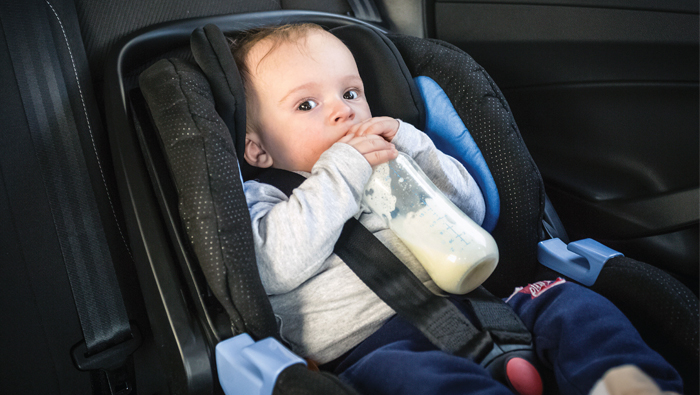
MUSCAT: “I will never drive a vehicle without having child restraints when travelling with children. I beseech everyone to take all safety measures while travelling with children. I have lost my child. I don’t want others to suffer the same way.”
These were the words of Rafneesh Iyyad, who lost his four-month-old baby girl, Rushda Fathima, in a tragic car accident in Sur on Friday.
His car veered off the road suddenly and toppled. His newborn daughter was not in a car seat and was thrown from the vehicle.
In the space of a few seconds, a family day out had ended one young life and wrecked others.
Road safety campaigners are trying to raise awareness in Oman about the dangers of children not being restrained in cars.
Sadly, it is still a common sight on our roads.
“We were on a pleasure trip to Al Kamil from Sur. I, my wife, our baby, our five-year-old son, a friend and his wife were in the four-wheel-drive. While we were driving along a straight road, somehow the car skidded off to the left side of the road. I tried but lost control and it toppled. I was told it had rolled over at least four times,” Rafneesh told the Times of Oman.
Ali Al Barwani, the Oman Road Safety Association (ORSA) chief executive officer, said that having child restraints in vehicles is a must.
“People spend a lot of money on children’s luxury. Unfortunately, they fail to see the importance of child restraints in the vehicles. They should see a child restraint as a must-have thing.
“Child restraints don’t cost much and are available easily in the market. By ignoring child restraints, you are putting your child’s life in danger,” the CEO said.
ORSA launched a nationwide programme, #saveyourchild in October to distribute car seats for young children and infants, and raise awareness on important road safety issues, including using seat belts properly and child restraints in all vehicles to safeguard passengers.
“In different parts of Oman, we had carried out the campaign. It is picking up. We want to develop the culture of child safety in vehicles. Safety of children aged between zero and 12, should be given priority when they are in the vehicles,” the CEO said, adding that it is not worth risking your child’s safety for a few rials on a child restraint.
In 2015, the Public Authority for Civil Defence and Ambulance (PACDA) reported that out of every five road accident deaths in Oman, one fatality was a child.
Similarly, of every three injured in these accidents, one was a child.
According to medics in Sur hospital, his daughter was brought in with severe injuries and was put on a life supporting ventilator.
“She had suffered severe injuries. We tried our best,” a medic said. Rafneesh’s wife Arifa Rafneesh suffered injuries on her hands and requires surgery.
“She needs to undergo surgery. We are processing papers to fly her back home. She has suffered injuries on both her hands,” Rafneesh added.
Baby Rushda was cremated in Sur on Friday. The World Health Organisation says the use of child restraints (child seats and booster seats) can reduce infant deaths in car crashes by 71 per cent and toddler deaths by 54 per cent.
A road safety expert said if a child seat had been used, there’s every chance the baby would have survived.
“I have investigated many incidents in the last nine years in Oman and it has been proven many times that simple compliance of seat belt use has saved lives even in very tragic incidents.
“On the other side, not using seat belts costs lives even in simple and small incidents. In the case of the accident in Sur, if a child seat had been used, I feel sure we would not be reading about this tragic experience,” Neelesh Sogani, a road safety expert, said.
He added that in Oman, people still do not understand the importance of seat belts for passengers in buses and back seat passengers.
“Use of child seats is very rare despite many road shows, campaigns and initiatives by the Royal Oman Police and charities. We frequently see irresponsible drivers or parents behind the wheel, who often have a child sitting in the front seat, sometimes on their laps as they drive. When a child is in the back seat, parents do not insist on wearing seatbelts. Children in school buses move around and are playing when the bus is running. Also, drivers are often distracted by mobiles and other tech-savvy gadgets,” he added.
Government statistics reveal that in October this year, 349 accidents were registered, compared to 303 in September and 326 in August.
Injuries fell by 25.8 per cent as of the end of October 2016, with 2,337 cases registered, compared to 3,148 during the same period last year.
Both Omani and expatriate victims of traffic accident injuries dropped by 27.2 per cent and 21.2 per cent, respectively, by the end of October this year.
Omanis registered 158 injuries in October, while expatriates recorded 66.
Though the rise has been small, death rates since the beginning of this year went up by only 0.5 per cent as of end of October 2016, compared to the same period last year with 565 deaths registered in 2016, compared to 562 last year.
Omani death rates decreased by 3.5 per cent through the end of October, compared to last year, with 361 deaths versus 374 on record. However, number of deaths increased in October 2016 with 40 registered, compared to 30 in September and 37 in August 2016.
Expatriates’ deaths registered an 8.5 per cent increase from the beginning of 2016 until the end of October, with 204 dying compared to 188. In October, 17 deaths were recorded, all of males, compared to 19 in September and 21 in August.